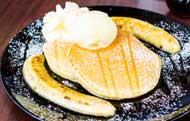
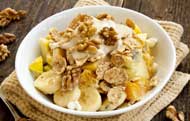
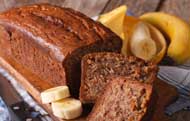
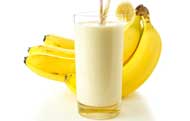


1. Banana Facts
2. Types of Bananas
3. Banana Nutritional Value
4. Banana Health Benefits
A banana is an elongated, edible fruit—botanically a berry—produced by several kinds of large treelike herbaceous flowering plants in the genus Musa. In some countries, cooking bananas are called plantains, distinguishing them from dessert bananas. The fruit is variable in size, colour and firmness, but is usually elongated and curved, with soft flesh rich in starch covered with a peel, which may have a variety of colours when ripe. It grows upward in clusters near the top of the plant. Almost all modern edible seedless (parthenocarp) cultivated bananas come from two wild species –Musa acuminata and Musa balbisiana, or their hybrids.
Musa species are native to tropical Indomalaya and Australia; they were probably domesticated in New Guinea. Bananas are eaten raw or cooked in recipes varying from curries to banana chips, fritters, fruit preserves, or simply baked or steamed.
Worldwide, there is no sharp distinction between dessert "bananas" and cooking "plantains": this distinction works well enough in the Americas and Europe, but it breaks down in Southeast Asia where many more kinds of bananas are grown and eaten. The term "banana" is applied also to other members of the Musa genus, such as the scarlet banana (Musa coccinea), the pink banana (Musa velutina), and the Fe'i bananas. Members of the genus Ensete, such as the snow banana (Ensete glaucum) and the economically important false banana (Ensete ventricosum) of Africa are sometimes included. Both genera are in the banana family, Musaceae.
History and Origin
Bananas originated in Southeast Asia, likely around 10,000 years ago, and were first domesticated in that region. From there, they were spread by traders and travellers to India, Africa, and Polynesia. Alexander the Great discovered them in India in 327 BC and introduced them to the Western world, while Portuguese sailors later brought them to the Americas via the Canary Islands. The bananas we eat today are a result of ancient crossbreeding of wild species, which were originally filled with large seeds.
- • Cavendish
- • Dwarf Cavendish
- • Goldfinger
- • Lady Finger Valery
- • Pacific Plantain
- • Red Dacca
- • Sucrier
- • Williams
The main types of bananas grown and sold in Australia are Cavendish and Lady Finger bananas, which together make up over 95% of the market. Cavendish varieties like Williams, Dwarf Cavendish, and Valery are the most common, while Lady Fingers are a smaller, sweeter, and more premium option. Other less common varieties grown include Red Dacca, Sucrier, and Pacific Plantains.
Primary types
Cavendish: This is the dominant variety, accounting for more than 90-97% of Australian production. It is the standard supermarket banana and includes sub-varieties such as:
Williams
Dwarf Cavendish
Valery
Lady Finger: A naturally sweeter, smaller banana that is also popular. It is a good source of vitamin C and doesn't brown as quickly as other bananas when cut.
Other types
Red Dacca: A less common variety with a reddish-purple skin.
Sucrier: Another smaller variety sometimes grown in Australia.
Pacific Plantain: Primarily used for cooking but also found in Australia.
Goldfinger: A lesser-known variety.
Fruit ” Banana ” ( Nutritional value )
Nutritional value per 100 g
Bananas, raws
|
Nutrient ( Proximate’s )
|
Unit
|
Value
|
Daily Value %
|
|
Energy
|
kcal
|
89
|
4.4%
|
|
Protein
|
g
|
1.09
|
2.1%
|
|
Total lipid (fat)
|
g
|
0.33
|
0.4%
|
|
Carbohydrate, by difference
|
g
|
22.84
|
8.3%
|
|
Fiber, total dietary
|
g
|
2.6
|
9.2%
|
|
Sugars, total
|
g
|
12.23
|
|
|
Minerals
|
|||
|
Calcium, Ca
|
mg
|
5
|
0.3%
|
|
Iron, Fe
|
mg
|
0.26
|
1.4%
|
|
Magnesium, Mg
|
mg
|
27
|
6.4%
|
|
Phosphorus, P
|
mg
|
22
|
1.7%
|
|
Potassium, K
|
mg
|
358
|
7.6%
|
|
Sodium, Na
|
mg
|
1
|
0.04%
|
|
Zinc, Zn
|
mg
|
0.15
|
1.3%
|
|
Copper, Cu
|
mg
|
0.078
|
8.6%
|
|
Manganese, Mn
|
mg
|
0.270
|
11.7%
|
|
Selenium, Se
|
mcg
|
1.0
|
1.8%
|
|
Fluoride, F
|
mcg
|
2.2
|
|
|
Vitamins
|
|||
|
Vitamin C, total ascorbic acid
|
mg
|
8.7
|
9.6%
|
|
Thiamin (B-1)
|
mg
|
0.031
|
2.5%
|
|
Riboflavin (B-2)
|
mg
|
0.073
|
5.6%
|
|
Niacin (B-3)
|
mg
|
0.665
|
4.1%
|
|
Pantothenic acid (B-5)
|
mg
|
0.334
|
6.6%
|
|
Vitamin B-6
|
mg
|
0.367
|
21.5%
|
|
Vitamin B-12
|
mg
|
0.00
|
|
|
Folate DFE (dietary folate) (B-9)
|
mcg
|
20
|
5%
|
|
Vitamin A, RAE (retinol)
|
mcg
|
3
|
0.3%
|
|
Vitamin E (alpha-tocopherol)
|
mg
|
0.10
|
0.6%
|
|
Vitamin D
|
mcg
|
0
|
|
|
Vitamin K (phylloquinone)
|
mcg
|
0.5
|
0.4%
|
|
Lipids
|
|||
|
Saturated Fatty Acids
|
g
|
0.112
|
0.5%
|
|
Monounsaturated Fatty Acids
|
g
|
0.032
|
|
|
Polyunsaturated Fatty Acids
|
g
|
0.073
|
|
|
Trans Fatty Acids
|
g
|
0.000
|
|
|
Carotenoids
|
|||
|
Beta-Carotene
|
mcg
|
26
|
|
|
Alpha-Carotene
|
mcg
|
25
|
|
|
Lutein + zeaxanthin
|
mcg
|
22
|
|

|
Reference Values are based on a 2,000 Calorie Intake, for Adults and Children 4 or More Years of Age. Your daily values may be higher or lower depending on your calorie needs.
|
|
Percentages are roughly approximated using (RDA) Recommended Dietary Allowances for adults. Source: Nutrient Database – USDA (United States Department of Agriculture)
|
|
Reference Values for Nutrition – FDA U.S. Food and Drug Administration
|
Banana Nutritional Value
Bananas offer numerous health benefits, including improving digestive health, supporting heart health through potassium and fiber, and providing energy from natural carbohydrates. They are also a good source of key nutrients like fiber, potassium, vitamin C, vitamin B6, and magnesium, which can aid in blood pressure management and athletic performance. Vitamins B6 and C, are known to support immune and metabolic function, and provide energy, making them a great option for exercise recovery.
- HEART HEALTH
Banana’s support heart health primarily due to their high potassium content, which helps manage blood pressure by counteracting excess sodium and relaxing blood vessel walls. They also provide fiber, magnesium, antioxidants, and other compounds that further protect the cardiovascular system by reducing inflammation and the risk of conditions like heart attack and stroke. - MOOD SUPPORT
Banana’s support mood because they contain tryptophan, an amino acid that the body converts to serotonin, the "feel-good" neurotransmitter. They also contain vitamin B6, which is essential for producing dopamine and serotonin, and nutrients like magnesium, potassium, and antioxidants that support nervous system function and can help alleviate depressive symptoms. - KIDNEY HEALTH
Whether bananas are safe for kidney health depends on the stage of kidney disease. They are high in potassium, which is vital for health but can be dangerous if the kidneys can't filter it properly, potentially causing heart problems. People with early-stage kidney disease or those with healthy kidneys can generally enjoy bananas, but those with advanced kidney disease or on dialysis must limit them, and individual needs should always be discussed with a doctor or dietitian. - NUTRIENT-RICH
Bananas are nutrient-rich fruits that are excellent sources of potassium, magnesium, vitamin B6, vitamin C, and fiber. These nutrients support various bodily functions, including heart health, immune function, and digestive health. A single medium-sized banana provides a good amount of these essential vitamins and minerals, making it a convenient and healthy food choice.
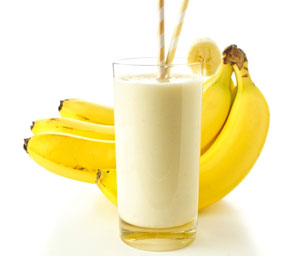
- DIGESTIVE HEALTH
Bananas support digestive health by providing both soluble and insoluble fiber, which helps regulate bowel movements. They also contain prebiotics like inulin and fructooligosaccharides that feed beneficial gut bacteria. Ripe bananas are gentle on the stomach and can help with issues like diarrhoea, while unripe bananas contain resistant starch that acts as a prebiotic. However, their high fiber, sorbitol, and resistant starch can cause gas, bloating, or loose stools in some individuals, especially if not accustomed to a high-fiber diet. - EXERCISE RECOVERY
Bananas are beneficial for exercise recovery because they replenish muscle glycogen, provide potassium to prevent cramps, and can reduce inflammation. Their easily digestible carbohydrates provide quick energy, and their natural compounds can help with muscle soreness and repair. - ENERGY AND EXERCISE
Bananas provide energy for exercise due to their high carbohydrate content, which is converted to glucose for fuel. They are a great pre-workout snack because their easily digestible carbs provide sustained energy, and their potassium helps with muscle function and hydration. Bananas are also beneficial post-exercise for replenishing muscle fuel stores and electrolytes lost through sweat. - BLOOD SUGAR REGULATION
Bananas can be part of a blood sugar-regulating diet, particularly when green (unripe) and eaten in moderation. The key is ripeness, portion size, and pairing the fruit with other foods like protein and fat. Unripe bananas have high levels of resistant starch, which is digested slowly and helps maintain stable blood sugar. Ripe bananas contain more sugar, so they can cause a more significant blood sugar rise.
References
Nutrient Database – USDA (United States Department of Agriculture)
Reference Values for Nutrition – FDA U.S. Food and Drug Administration
Heart health - Banana’s support heart health primarily due to their high potassium content, which helps manage blood pressure by counteracting excess sodium and relaxing blood vessel walls. They also provide fiber, magnesium, antioxidants, and other compounds that further protect the cardiovascular system by reducing inflammation and the risk of conditions like heart attack and stroke.
The high potassium in bananas helps regulate blood pressure and maintain overall heart function. Fiber in bananas can also help lower "bad" cholesterol (LDL).
Digestive health - Bananas support digestive health by providing both soluble and insoluble fiber, which helps regulate bowel movements. They also contain prebiotics like inulin and fructooligosaccharides that feed beneficial gut bacteria. Ripe bananas are gentle on the stomach and can help with issues like diarrhea, while unripe bananas contain resistant starch that acts as a prebiotic. However, their high fiber, sorbitol, and resistant starch can cause gas, bloating, or loose stools in some individuals, especially if not accustomed to a high-fiber diet.
Bananas are rich in fiber and water, which promotes regularity and helps prevent constipation. They are also part of the BRAT diet (bananas, rice, applesauce, toast), which can be helpful for digestive issues like diarrhoea.
Energy and exercise - Bananas provide energy for exercise due to their high carbohydrate content, which is converted to glucose for fuel. They are a great pre-workout snack because their easily digestible carbs provide sustained energy, and their potassium helps with muscle function and hydration. Bananas are also beneficial post-exercise for replenishing muscle fuel stores and electrolytes lost through sweat.
As a good source of carbohydrates and fiber, bananas provide a natural energy boost, making them a popular pre- or post-workout snack that can aid in exercise performance and recovery.
Nutrient-rich - Bananas are nutrient-rich fruits that are excellent sources of potassium, magnesium, vitamin B6, vitamin C, and fiber. These nutrients support various bodily functions, including heart health, immune function, and digestive health. A single medium-sized banana provides a good amount of these essential vitamins and minerals, making it a convenient and healthy food choice.
Mood support - Banana’s support mood because they contain tryptophan, an amino acid that the body converts to serotonin, the "feel-good" neurotransmitter. They also contain vitamin B6, which is essential for producing dopamine and serotonin, and nutrients like magnesium, potassium, and antioxidants that support nervous system function and can help alleviate depressive symptoms.
Blood sugar regulation - Bananas can be part of a blood sugar-regulating diet, particularly when green (unripe) and eaten in moderation. The key is ripeness, portion size, and pairing the fruit with other foods like protein and fat. Unripe bananas have high levels of resistant starch, which is digested slowly and helps maintain stable blood sugar. Ripe bananas contain more sugar, so they can cause a more significant blood sugar rise.
The fiber in bananas can help regulate blood sugar levels. However, people with diabetes should consume them in moderation and consult a doctor or dietitian.
Bananas, exercise and recovery - Bananas are beneficial for exercise recovery because they replenish muscle glycogen, provide potassium to prevent cramps, and can reduce inflammation. Their easily digestible carbohydrates provide quick energy, and their natural compounds can help with muscle soreness and repair.
